|
Dusty Dog Reviews The whole project is hip, anti-academic, the poetry of reluctant grown-ups, picking noses in church. An enjoyable romp! Though also serious. |
|
Nick DiSpoldo, Small Press Review (on Children, Churches and Daddies, April 1997) Children, Churches and Daddies is eclectic, alive and is as contemporary as tomorrow’s news. |



|
Kenneth DiMaggio (on cc&d, April 2011) CC&D continues to have an edge with intelligence. It seems like a lot of poetry and small press publications are getting more conservative or just playing it too academically safe. Once in awhile I come across a self-advertized journal on the edge, but the problem is that some of the work just tries to shock you for the hell of it, and only ends up embarrassing you the reader. CC&D has a nice balance; [the] publication takes risks, but can thankfully take them without the juvenile attempt to shock. |
|
from Mike Brennan 12/07/11 I think you are one of the leaders in the indie presses right now and congrats on your dark greatness. |
Volume 234, July 2012
Internet ISSN 1555-1555, print ISSN 1068-5154
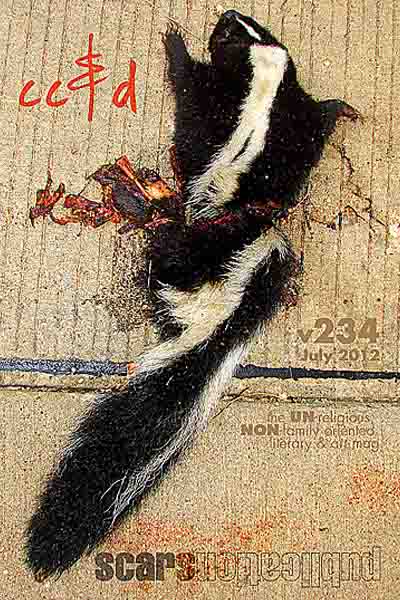
see what’s in this issue...
Note that in the print edition of cc&d magazine, all artwork within the pages of the book appear in black and white.
|
Order this issue from our printer as a paperback book (5.5" x 8.5") perfect-bound w/ b&w pages |

poetry
the passionate stuff
She Just CalledJoseph Hart
I just wish that George weren’t crazy.
|
As I See ItJoseph Hart
Everyone loves Hammerstein.
|
| Janet Kuypers reads the Joseph Hart July 2012 (v234) cc&d poem As I See It |

See YouTube video of Janet Kypers reading his poem straight from the July 2012 issue (v234) of cc&d magazine, live 7/18/12 at Gallery Cabaret’s the Café Gallery open mic in Chicago) |
FlailingBruce Matteson
One man stands
When the showdown comes
One man stands
|
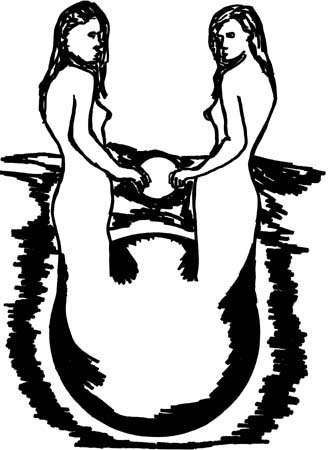
the World is Round, art by
Edward Michael O’Durr Supranowicz
The Great Sea YearnsRobert D. Lyons
A body washed up beside the river
|

Cerulean, art by Rose E. Grier
Family Poison PackBrian Looney
Buy ‘em up, a dirty eight-count, the family poison pack. They’re only going down the throat and flooding through the body.
They only power vital organs: heart, kidneys, liver, lungs, brain, etc.
Family poison pack, dirty dollars, a week of mangy meals.
Give me a gut bomb, a foamy filler.
|
| Janet Kuypers reads the Brian Looney July 2012 (v234) cc&d poem Family Poison Pack |

See YouTube video of Janet Kypers reading his poem straight from the July 2012 issue (v234) of cc&d magazine, live 7/18/12 at Gallery Cabaret’s the Café Gallery open mic in Chicago) |
Brian Looney BioBrian Looney was born 12/2/85 and is from Albuquerque, NM. He likes it when Lady Poetry kicks him in the head. The harder the better. Check out his website at Reclusewritings.com.
|
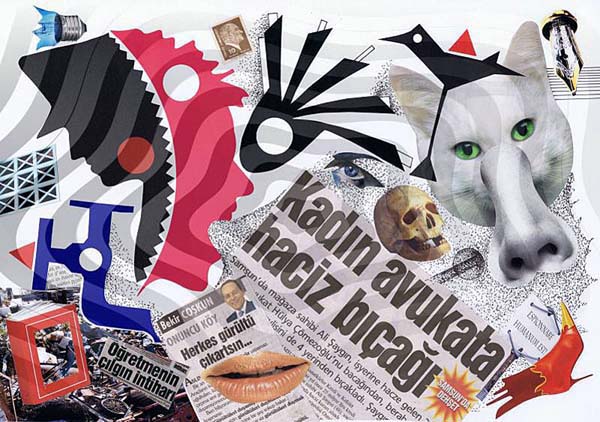
CCI12112010_00000K4K, art by Üzeyir Lokman ÇAYCI>
On a New Psychological DisorderMichael Ceraolo
Symptoms:
|
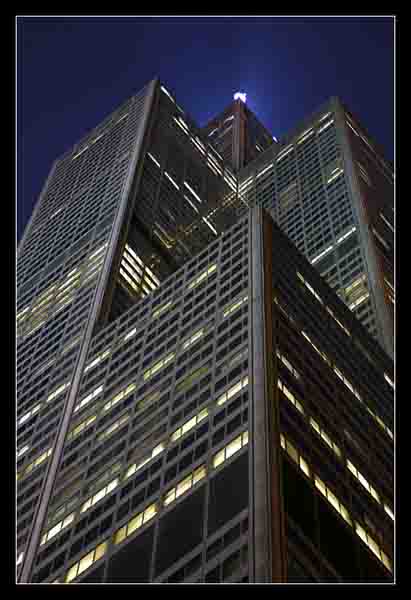
at 110 Stories, art by Nick Brazinsky
Uncle Sam gives Liberty the axI.B. Rad
Poor ol’ Uncle’s
|
| Janet Kuypers reads the I.B. Rad July 2012 (v234) cc&d poem Uncle Sam Gives Liberty the Axe |

See YouTube video of Janet Kypers reading his poem straight from the July 2012 issue (v234) of cc&d magazine, live 7/4/12 at Gallery Cabaret’s the Café Gallery open mic in Chicago) |

Emergency, art by Oz Hardwick
The PoetAndrew H. Oerke
His words enter your words’ black pupil-periods,
|
About Andrew H. OerkePoems by Andrew H. Oerke have appeared in The New Yorker, The New Republic, Poetry, and in numerous other magazines. In 2006 two new books of poetry by Andrew H. Oerke, African Stiltdancer and San Miguel de Allende, were published jointly by Swan Books and the UN Society for Writers and Artists. They have received the United Nations Literature Award. ’s most recent book, Never Seek to Tell Thy Love, was published in 2010.
|
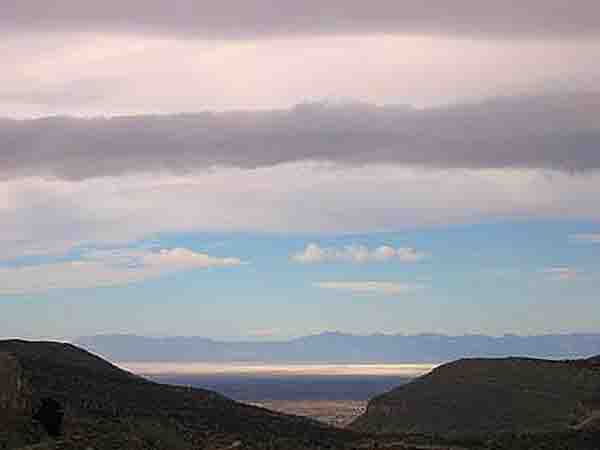
Skuline (from Osha, Dog Canyon), photo by Brian Hosey and Lauren Braden

Primordial Essence, art by David Michael Jackson
BastardKelly Darrow
Covered with dark shades
|
Mom’s First HusbandCorey Cook
On nights Joni Mitchell’s voice unspooled from the spinning
leaned into the cupboard for SpaghettiOs or Chef Boyardee.
in the upper right corner, Dad tucked us into bed without
cried out, I should have stopped him, Dad lifted the needle,
|
| Bob Rashkow reads the Corey Cook July 2012 (v234) cc&d poem Mom’s First Husband |

See YouTube video of Bob Rashkow reading his poem straight from the July 2012 issue (v234) of cc&d magazine, live 7/4/12 at Gallery Cabaret’s the Café Gallery open mic in Chicago) |
Corey Cook Biography (20120312)Corey Cook is the author of two chapbooks: Rhodendron in a Time of War (Scars Publications) and What to Do with a Dying Parakeet (Pudding House Publications). His work has recently appeared in Foliate Oak Literary Journal and new pieces are forthcoming in Red River Review, The Rusty Nail, and THRUSH Poetry Journal. Corey edits The Orange Room Review with his wife, Rachael. They live in Thetford Center, Vermont with their two daughters.
|
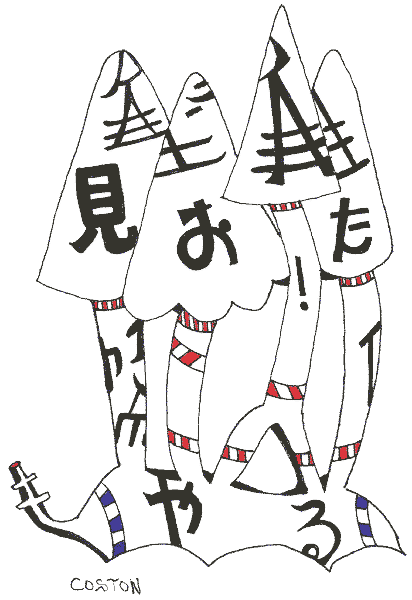
art by George Coston
Us, Actually Touching
Janet Kuypers |
Beauty in the Eyes of EinsteinJanet Kuypers(started 11/04/11, completed 11/15/11)
I heard NASA scientists say even some theories we may know all too well
but Einstein didn’t like some of his theories
and I wonder:
is it the geomagnetic abberations
is it the way you look at me
is it the scattered collisions from comet
is it what I feel
is it the eternally changing
is it the way that listening
or is it converting matter into pure energy
Einstein believed
so am I driven
Einstein reminds us,
so is it how on impulse we ask, what is beauty
they say beauty is in the eye of the beholder
|
Gonna BreakJanet Kuypers(12/01/11)
after almost losing my life
and this life line’s been a godsend
it’s been a nice ride
and yeah, i hated
but at least i’m on this little donut
and it was all smooth sailing
when i looked up
that’s when i realized
so now i float here
i look at the shoreline
so i look back at my life line
|
mechanical soldiersJanet Kuypers(11/30/11 twitter-length poem)
power line towers they’re our little mechanical soldiers
they’ll rip the electric lines out
|

Zach Makes Me
Janet Kuypers |
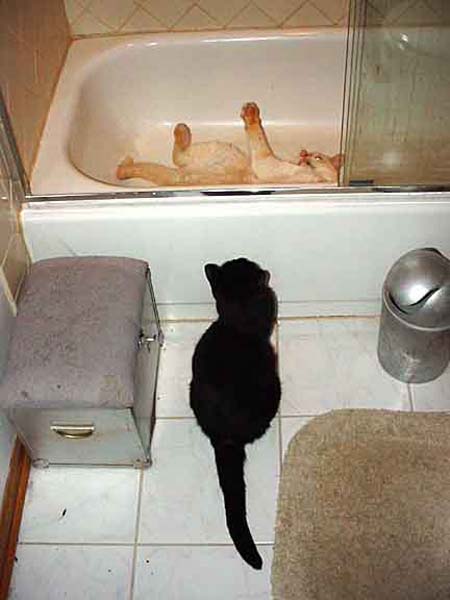
Janet Kuypers Bio
Janet Kuypers has a Communications degree in News/Editorial Journalism (starting in computer science engineering studies) from the UIUC. She had the equivalent of a minor in photography and specialized in creative writing. A portrait photographer for years in the early 1990s, she was also an acquaintance rape workshop facilitator, and she started her publishing career as an editor of two literary magazines. Later she was an art director, webmaster and photographer for a few magazines for a publishing company in Chicago, and this Journalism major was even the final featured poetry performer of 15 poets with a 10 minute feature at the 2006 Society of Professional Journalism Expo’s Chicago Poetry Showcase. This certified minister was even the officiant of a wedding in 2006. |

prose
the meat and potatoes stuff
Climbing Mt. FujiJohn RachelI was climbing Mt. Fuji when seemingly out of nowhere appeared a beautiful geisha. She didn’t speak but beckoned me to follow her and I did. She led me back to a small but very charming palace. She took me to her private chambers, turned her back to me and unhooked one clasp that held her entire kimono in place. When it fell to the floor, a butterfly emerged and flew out the window. I followed its flight. It grew and grew in size until the entire sky was darkened with the expanse of its wings. Temperatures dropped and clouds boiled in the heavens, an ominous warning that storms which would destroy the earth would soon arrive. Suddenly, the enormous bulk of Godzilla rose over the skyline of Tokyo. He had a huge flyswatter in his hand. With one mighty muscular swipe, he smashed the butterfly and the entrails splattered as far as Vladivostok. I returned to the trail but was extremely hungry, so instead of completing the climb of Mt. Fuji I went back to base camp and ate a light but satisfying meal of tofu and rice.
|
John Rachel short bioJohn Rachel has a B. A. in Philosophy, has traveled extensively, is a songwriter and music producer, and a left-of-left liberal. Prompted by the trauma of graduating high school and having to leave his beloved city of Detroit to attend university, the development his social skills and world view were arrested at about age 18. This affliction figures prominently in all of his creative work. He is author of four full-length novels, From Thailand With Love, The Man Who Loved Too Much, 11-11-11 and the just published 12-12-12. He considers his home to be Japan but has been traveling in Indonesia, the Philippines and Taiwan while he works on new stories and promotes his latest project, Leaving On A Jet Plane, a creative non-fiction piece about his five plus years as a literary vagabond.
|

image of mountains near the Great Wall of China (closest to Beijing) by John Yotko
I wake up with my nose in Kafka’s dungbeetleFritz Hanilton
I wake up with my nose in Kafka’s dungbeetle. I am a mosquito, & when Kafka wants to question our relationship, it’s serious. The dungbeetle explains to Kafka that she’s pregnant, & breaking up with me would leave the child fatherless. Kafka says when the father is a mosquito, it’s better for the child to have nothing to do with him, leaving my nose limp & depressed. Kafka, thank Jesoo, retires to his castle, & we’re free to marry or not. I take Franz seriously. Maybe a mosquito is not capable of raising a kid that pops out of a dungbeetle. Maybe the little bastard is best off fending for himself, & I should keep my nose out of his business. It’s a jungle out there, & mosquitos thrive in the jungle, but a dungbeetle is better off in a toilet where he’s closer to the dung.
|
Republicans prove their worthFritz Hamilton
Republicans prove their worth by having the legs of all women about to have abortions tied together & sent to Auschwitz. They can’t abort now. Instead they explode for little perverts & monsters to fly into the world to perish in agony, as the Republicans look on & cheer. The women, now pieces of flesh & blood, are too dead to vote, which is another Republican victory, because the fewer people who vote, the greater chance for a GOP victory in our American plutocracy & slaughterhouse.
|
Idol WorshipRonald M. Wade
I was working on a manuscript when Max walked in and sat down on my couch. He had his own coffee in a thermal cup.
|



LeMonde Images 011, 015 and 110 from Aaron Wilder
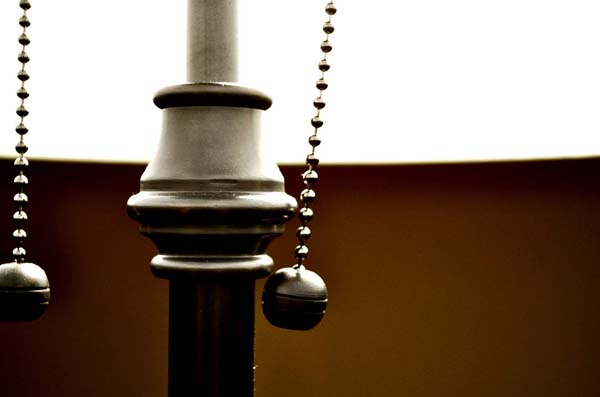
Knock, art by Peter LaBerge
The InterruptionW. Dontā Andrews
Near downtown is the north end neighborhood. Really, it’s just a couple of streets, not quite the Nothing side of town, but in close enough proximity to turn noses upward. He bought his house forty years ago, however, and he damn sure wasn’t leaving because things around it had changed. As long as people stayed out of his yard, fine. He formed the story in his head the way he did the pieces he had written for the journal. He sat next to the front window in that dark green recliner, hands folded in his lap, a thick slice of morning light showing through the sheers. He reflected.
Not only one, no, I had four or five different ways to say it, ways to show it. Need. But nothing would have kept them. She is gone. He is gone. Everyone is gone. What is the point?
|
W. Dontā Andrews BioW. Dontā Andrews lives and writes in Kalamazoo, Michigan. He studied Business Management at Cornerstone University. He studies life for writing material. He founded and has run a regularly attended writers group for the past 6 years. His work was also published in the anthology “All Poetry is Prayer” (Creative Justice Press). Recently he finished his first book, a collection of stories and poetry concentrated on self awareness, or rather the epidemic of its absence in the world today. It includes the pieces accepted for publication in CC&D Magazine. He is currently working on a novel.
|
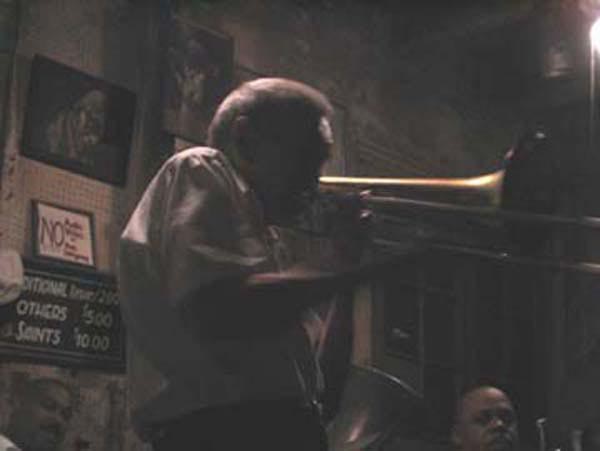
Trombone, art by Cheryl Townsend
FineDana Blake
Conrad Conway’s problem was he never had very-good morals. Or at least, that was the way it felt. After all, why was life so hard all the time? It seemed not having very good morals explained it; or at least partly explained it.
|
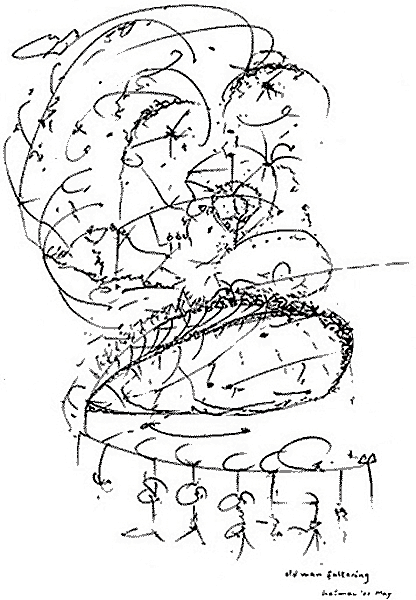
Old Man Faltering, art by the HA!man of South Africa
Greenlighting Brennan
Brian Duggan |
On Social NetworkingChristine Barba
“Welcome to another shitty introduction course that the university forced me to teach,” Mr. Triste said, squinting at the students sitting in the amphitheater.
|

editor’s note...
follow cc&d issues and book releases
online through the editor on facebook,
at http://www.facebook.com/janetkuypers
CarnivalRex Sexton
Each face a phantom version of itself, each figure spectral, each street a shaft of smoke and mirrors ...
|
About a DriverSterling A Slechta
When I walked into work I saw Marcus smiling, sleep-deprived with his red eyes and cigar-stained teeth. He was sitting next to the plastic trashcans in the middle of the garage in a desk chair with a broken wheel, newspaper in hand, coffee on the ground by his feet, a white light flickering overhead. “You’re in early,” he said.
There was trash in the streets. A morning wind behind plastic bags and fliers and scraps of newspapers and take-out menus. Another day about to fall into the past like so many others—the hours swallowed up by routine, regurgitated as a paycheck, as a means to stay alive.
An old couple watched a weatherman on the rest area TV as he waved his arms and told them about the next big storm. They were sitting on the only bench in the building, sharing a cup of coffee, straining their brows like they believed every word he said. I guess age doesn’t guarantee a decline in gullibility. Or maybe they just weren’t from around here.
“How was your week?” asked the tall girl with the dark eyes and the visor at the McDonald’s drive-through.
The alarm on my cell phone started beeping at 2:30.
“What’s up stranger,” said Lisa as I walked into the garage. I dropped the stack of totes I was carrying and let out a sigh.
In my apartment, the bathroom was lit only by light bleeding in from the hallway behind me. It threw my shadow on the wall in the shower, my touseled hair like some demonic crown as I sat on the edge of the tub with my clothes on the floor behind me.
“What’s a destrudo?” asked the anorexic girl who was lying on the couch with her legs crossed on her boyfriend’s lap. She had an ultra-light cigarette in one hand and was passing a joint to Lisa with the other. Her name was Jess—one of Lisa’s friends from high school who never made it out of the neighborhood she grew up in. Ten years ago she would’ve said she wanted to be an actress. Now all she wanted to be was a good mother. Things change like that.
At some point the memories stopped, and I was dreaming.
My first thought was the realization that I didn’t have my credit card. It was still at a bar somewhere between Lisa’s house and the harbor. Not for the first time, I was the drunken idiot who stumbled out into the night without closing his tab. Probably lucky, though. I would’ve messed up the tip. My car was there, too. But I was proud of that one. A couple years ago I doubt I would’ve thought twice. Not anymore. When you drive 360 miles a day, walking five doesn’t seem like much.
|
Sterling A Slechta BioSterling Slechta is a fiction writer from Upstate New York. He studied religion at Syracuse University and since graduating, has made his living working in parks, prisons, nursing homes, and schools. He currently lives and writes in Brooklyn, NY.
|

Underpass, art by Brian Forrest
When Christ Reached NirvanaAlexander P.S.I was standing there thinking whether or not I would go to hell, just as the priest was holding the bread above the cup of wine and water. I thought about all of the good and bad things that I had done, and I wondered if they evened each other out. Then I wondered if it worked like that: one good deed cancels out one bad. I figured it didn’t because I remember reading a philosopher who wrote that when you get to heaven you’ll see people you never expected to, and some of the people you expected to see won’t be there. It was all plain and confusing to me because I saw religion as a group of people who know, but don’t really know. I related it to waiting to hear back from a college that, with your grades and impressive extracurriculars, you’d be sure to get into. And you could be as sure as you wanted that you would get into that college, but the truth is that there would be no way to actually know except for when the letter arrives in your mailbox.
All my life I had been raised in the Catholic faith and I started to drift away from it when I was about sixteen years old. I was attending a Catholic high school in northern Illinois and that place really put me off to religion in general. I started to see it as nothing but groups of people who claimed that their group held more truth than the others. I remember a conversation I had in a comparative religions class that I took the last semester of my senior year. The teacher was a real nice guy by the name of Mr. Vince. He played in a christian rock band and was always trying to get me to strengthen my faith. One day during class we delved into the topic of Buddhism and the birth of its founder, Siddhartha Gautama. There was a real asshole sitting to my left named Joseph David. Joseph was the worst type of asshole, the coward type that would act all sorts of friendly to your face because he didn’t have the balls to be real. He always had something stupid to say, too. And no matter what he said, his paparazzi would laugh and give him a hi-five; he was a jock. And as I stood in the back of the church as the priest was holding the bread above the chalice, I wondered if I would go to hell. I wondered if my ideals were all wrong and someday I would meet the creature that is making Hitler dance for eternity. I wondered if good deeds outweighed the bad, and above all, I wondered what exactly good was.
|

art by Eric Bonholtzer
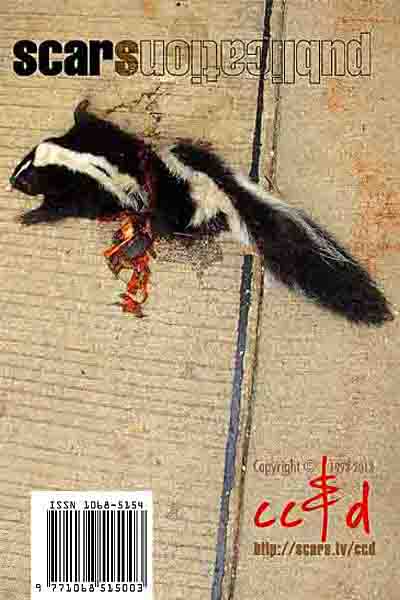 
Debra Purdy Kong, writer, British Columbia, Canada I like the magazine a lot. I like the spacious lay-out and the different coloured pages and the variety of writer’s styles. Too many literary magazines read as if everyone graduated from the same course. We need to collect more voices like these and send them everywhere.
Children, Churches and Daddies. It speaks for itself. Write to Scars Publications to submit poetry, prose and artwork to Children, Churches and Daddies literary magazine, or to inquire about having your own chapbook, and maybe a few reviews like these.
what is veganism? A vegan (VEE-gun) is someone who does not consume any animal products. While vegetarians avoid flesh foods, vegans don’t consume dairy or egg products, as well as animal products in clothing and other sources. why veganism? This cruelty-free lifestyle provides many benefits, to animals, the environment and to ourselves. The meat and dairy industry abuses billions of animals. Animal agriculture takes an enormous toll on the land. Consumtion of animal products has been linked to heart disease, colon and breast cancer, osteoporosis, diabetes and a host of other conditions. so what is vegan action?
We can succeed in shifting agriculture away from factory farming, saving millions, or even billions of chickens, cows, pigs, sheep turkeys and other animals from cruelty. A vegan, cruelty-free lifestyle may be the most important step a person can take towards creatin a more just and compassionate society. Contact us for membership information, t-shirt sales or donations.
vegan action
Children, Churches and Daddies no longer distributes free contributor’s copies of issues. In order to receive issues of Children, Churches and Daddies, contact Janet Kuypers at the cc&d e-mail addres. Free electronic subscriptions are available via email. All you need to do is email ccandd@scars.tv... and ask to be added to the free cc+d electronic subscription mailing list. And you can still see issues every month at the Children, Churches and Daddies website, located at http://scars.tv
MIT Vegetarian Support Group (VSG)
functions: We also have a discussion group for all issues related to vegetarianism, which currently has about 150 members, many of whom are outside the Boston area. The group is focusing more toward outreach and evolving from what it has been in years past. We welcome new members, as well as the opportunity to inform people about the benefits of vegetarianism, to our health, the environment, animal welfare, and a variety of other issues.
Dusty Dog Reviews: These poems document a very complicated internal response to the feminine side of social existence. And as the book proceeds the poems become increasingly psychologically complex and, ultimately, fascinating and genuinely rewarding.
Dusty Dog Reviews: She opens with a poem of her own devising, which has that wintry atmosphere demonstrated in the movie version of Boris Pasternak’s Doctor Zhivago. The atmosphere of wintry white and cold, gloriously murderous cold, stark raging cold, numbing and brutalizing cold, appears almost as a character who announces to his audience, “Wisdom occurs only after a laboriously magnificent disappointment.” Alas, that our Dusty Dog for mat cannot do justice to Ms. Kuypers’ very personal layering of her poem across the page.
Fithian Press, Santa Barbara, CA Indeed, there’s a healthy balance here between wit and dark vision, romance and reality, just as there’s a good balance between words and graphics. The work shows brave self-exploration, and serves as a reminder of mortality and the fragile beauty of friendship.
Mark Blickley, writer You Have to be Published to be Appreciated. Do you want to be heard? Contact Children, Churches and Daddies about book or chapbook publishing. These reviews can be yours. Scars Publications, attention J. Kuypers. We’re only an e-mail away. Write to us.
The Center for Renewable Energy and Sustainable Technology The Solar Energy Research & Education Foundation (SEREF), a non-profit organization based in Washington, D.C., established on Earth Day 1993 the Center for Renewable Energy and Sustainable Technology (CREST) as its central project. CREST’s three principal projects are to provide: * on-site training and education workshops on the sustainable development interconnections of energy, economics and environment; * on-line distance learning/training resources on CREST’s SOLSTICE computer, available from 144 countries through email and the Internet; * on-disc training and educational resources through the use of interactive multimedia applications on CD-ROM computer discs - showcasing current achievements and future opportunities in sustainable energy development. The CREST staff also does “on the road” presentations, demonstrations, and workshops showcasing its activities and available resources. For More Information Please Contact: Deborah Anderson dja@crest.org or (202) 289-0061
Dorrance Publishing Co., Pittsburgh, PA want a review like this? contact scars about getting your own book published.
 The magazine Children Churches and Daddies is Copyright © 1993 through 2012 Scars Publications and Design. The rights of the individual pieces remain with the authors. No material may be reprinted without express permission from the author. 
Okay, nilla wafer. Listen up and listen good. How to save your life. Submit, or I’ll have to kill you.
Dorrance Publishing Co., Pittsburgh, PA: “Hope Chest in the Attic” captures the complexity of human nature and reveals startling yet profound discernments about the travesties that surge through the course of life. This collection of poetry, prose and artwork reflects sensitivity toward feminist issues concerning abuse, sexism and equality. It also probes the emotional torrent that people may experience as a reaction to the delicate topics of death, love and family. “Chain Smoking” depicts the emotional distress that afflicted a friend while he struggled to clarify his sexual ambiguity. Not only does this thought-provoking profile address the plight that homosexuals face in a homophobic society, it also characterizes the essence of friendship. “The room of the rape” is a passionate representation of the suffering rape victims experience. Vivid descriptions, rich symbolism, and candid expressions paint a shocking portrait of victory over the gripping fear that consumes the soul after a painful exploitation.
Dusty Dog Reviews (on Without You): She open with a poem of her own devising, which has that wintry atmosphere demonstrated in the movie version of Boris Pasternak’s Doctor Zhivago. The atmosphere of wintry white and cold, gloriously murderous cold, stark raging cold, numbing and brutalizing cold, appears almost as a character who announces to his audience, “Wisdom occurs only after a laboriously magnificent disappointment.” Alas, that our Dusty Dog for mat cannot do justice to Ms. Kuypers’ very personal layering of her poem across the page.
|
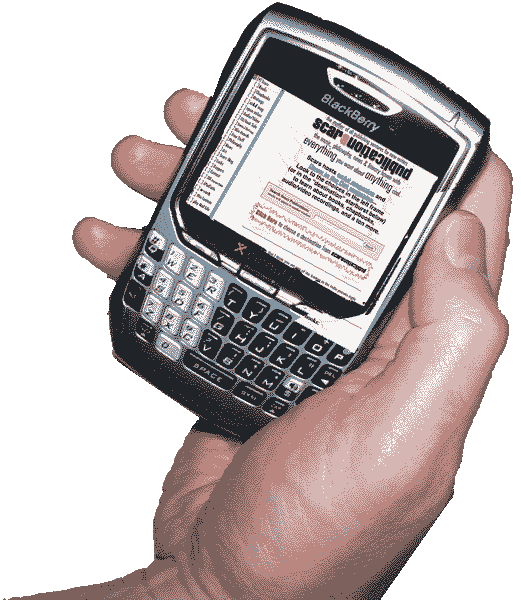 “Now for tonight what I want you all to do is to go on the Social Networking Site for four hours. I want you to look at all of your ex boyfriend or girlfriends’ most recent photos and statuses, and I want you to analyze how all of the statuses were developed especially for you. There is a purpose behind every update, and you will know immediately that these purposes are always directed towards you. Even if it says ‘Taking my cat for a walk,’ we all know that the status is about you. You are God.” The bobble head version of himself that sat on the podium expressed its approval.
“Now for tonight what I want you all to do is to go on the Social Networking Site for four hours. I want you to look at all of your ex boyfriend or girlfriends’ most recent photos and statuses, and I want you to analyze how all of the statuses were developed especially for you. There is a purpose behind every update, and you will know immediately that these purposes are always directed towards you. Even if it says ‘Taking my cat for a walk,’ we all know that the status is about you. You are God.” The bobble head version of himself that sat on the podium expressed its approval.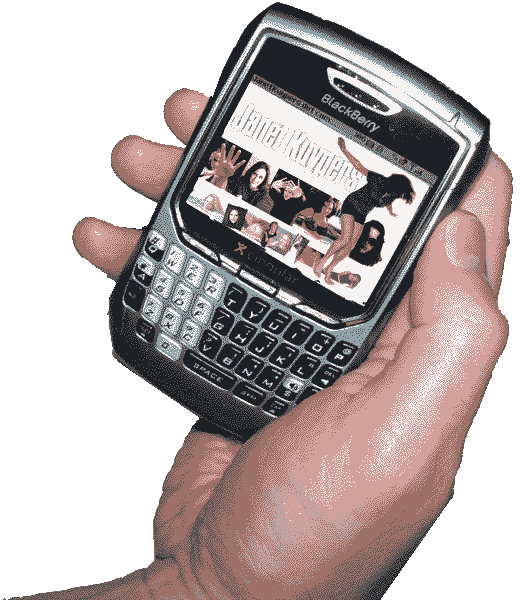 “Uh huh,” Carly said rolling her eyes.
“Uh huh,” Carly said rolling her eyes.